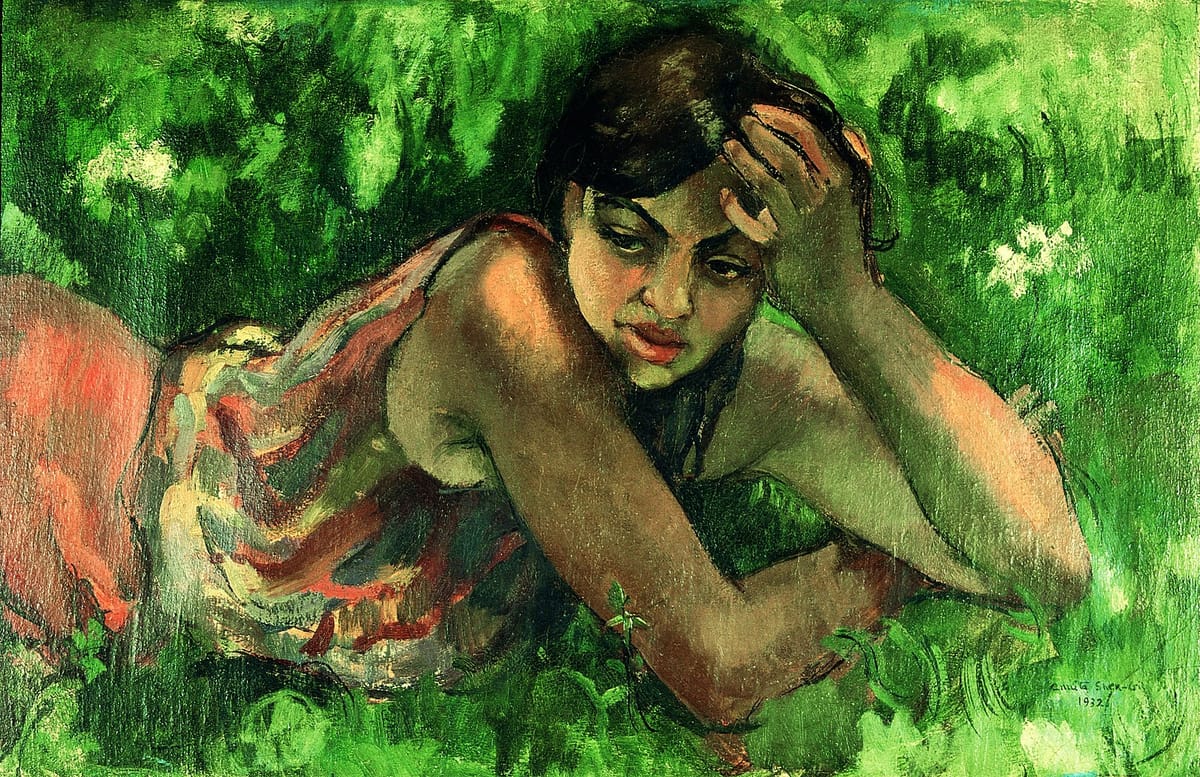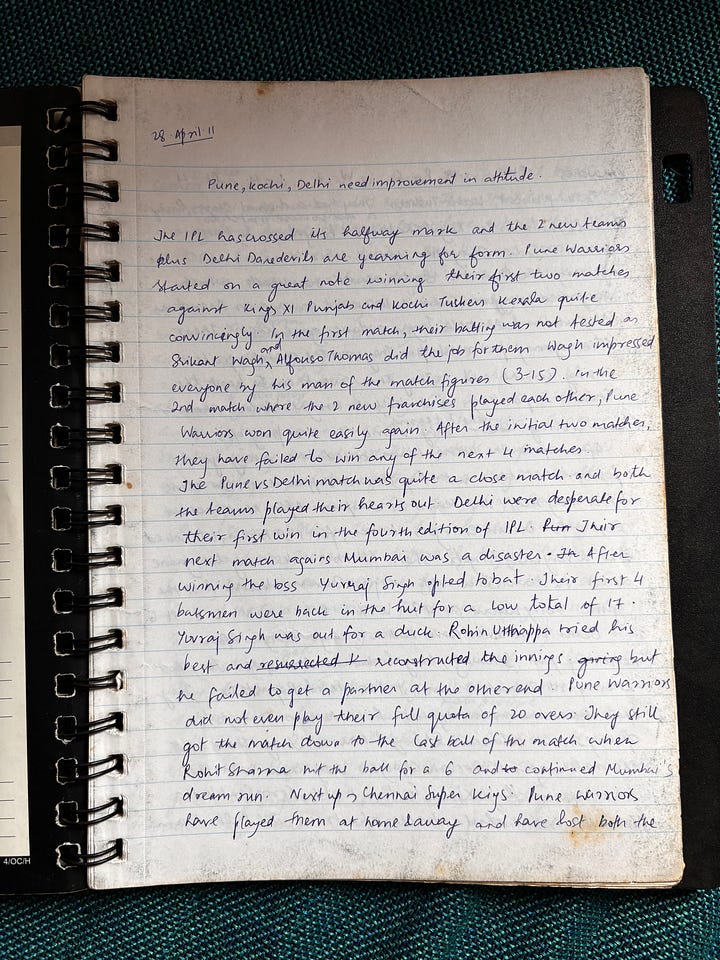How to lose your spark
...and look for it again.

I found a notebook I had with me in boarding school. It was full of match reports of cricket and football matches. It also contained a draft of a story (novella?) that I wrote for fun. I remember I would write a few pages, and then share it with my dorm-mates who would read and give me their feedback, or sometimes, demands on where the story should go. It was a love story (of course) that included a little beyond my boarding school bubble, thanks in large parts to my sister studying at Jawaharlal Nehru University, where I spent parts of my winter holidays. Ganga Dhaba, Parthasarathy Rocks, and the old Basant Lok market all made random appearances.
I was still more fascinated by finding these match reports. You see, we could actually watch very few matches in school. Three or four of us had enough interest to coax our housemates into following sports in the common room. We were permitted to watch television on the weekends, starting from Saturday evening when there was no ‘prep’ or homework time, lasting until Sunday 6 pm when we began prep for Monday. Now, this one day of television time was obviously precious, and it was dedicated to watching what around 45 people (or the seniors who called the shots) in the house wanted to see. Thankfully, I had three other house mates who loved cricket. Besides, the World Cups were big enough for more people to want to tune in, and there was at least one house (out of five) where the common room had the match on for us sports buffs.

But the reports I am referring to were from IPL matches, which meant that if I did watch parts of these matches, it came after a lot of negotiation with friends. As for the Liverpool matches, it was definitely based on the highlights I would have seen sneakily on YouTube in time dedicated exclusively to Model United Nations (MUN) research. I distinctly remember scouring the newspapers we got in school to check for statistics, and bowling and batting figures to include in my handwritten reports. Later, during 'outings' when our parents or guardians took us out of school (on Sundays from 9 am to 6 pm), or in stolen moments in our computer lab when we illegally accessed our email through proxy websites, I would type these reports out and save them in my drafts.
I'm trying to understand how this process—watching matches or highlights, often just reading about them, then composing my own reports by hand and then transcribing them in spare time—never felt tiresome. It actually gave me tremendous joy. Maybe it was my grandfather's influence. Baba was a Hindi novelist who would always write his first drafts on paper, then type the final draft on his trusty old typewriter before sending it to the publisher.
I’m trying to think even further back before I went to boarding school. When I was seven or eight, I went around to my classmates with a note asking them for their submissions for a magazine I would start, called 'Kids' World'. My uncle owned a printing press, and in my childlike logic, publishing seemed entirely feasible.
I envisioned a magazine which would have jokes, stories, and articles. I told my mother, who helped me frame this note, and took it around to my classmates. They didn't share the same enthusiasm, but at least I tried.
In college, I wrote for sports websites, churning out football articles almost daily. I finally had the satisfaction of getting published professionally, not for the money, but to have an audience read what I had written. I gradually transitioned from writing about football to exploring the behind-the-scenes world of sports operations. Over time, my writing gradually slowed, then became erratic, and eventually, stopped altogether.
Growing up, I was equally passionate about music. I studied classical Hindustani music throughout school, even scoring a perfect 100 on my 12th board practicals and winning the excellence in music trophy. But I was pragmatic, and knew I could only truly pursue one interest. So, music eventually lost out to sports, or rather, to sports writing
I tried to sustain some of my love for music by starting a music website with a college friend. It began as a simple blog, covering Bollywood and popular English music, occasionally featuring Indian bands. But when my husband—a trained journalist, western music student, and far better music writer than me—saw potential beyond our half-serious beginnings, we relaunched it as a proper publication dedicated entirely to Indian independent music.
Building that publication brought me immense joy, far beyond just my love for indie music. I loved the process of running something: commissioning articles, curating year-end lists, and especially putting together the annual print magazine. Working with designers on artwork and typesetting, negotiating for every rupee with the printers (because it all counts), collecting addresses, shipping this labour of love brought me so much joy. Marketing it was always tough, but the thrill of putting it all together was wonderful. Doing this together with friends made it even more fulfilling.
But people grow apart, things happen, life gets messier. So, this ended early last year, leaving me without a passion project. What remained felt like the dying embers of a flame.
Learning to begin again
I wish I could muster this kind of drive once again, have that unquestioning belief that something could exist simply because I willed it into being. I look for inspiration everywhere, for clarity, for guidance. Have I become lazy? Is this just the uncertain space for a freelancer between projects? Or is it simply this stage of life, where we start seeking more profound answers to questions.
Albert Camus writes in The Myth of Sisyphus, “We get into the habit of living before acquiring the habit of thinking”. It is not a dearth of things to do. I have a routine to follow, hobbies to indulge in, activities to do, and friends to do those activities with. It is easy to perform life, but asking why is difficult—and I'm conscious that having the space to ask ‘why’ is itself a massive privilege in our unequal world.
The Irish poet, priest and philosopher John O’Donohue, in To Bless the Space Between Us: A Book of Blessings, talks about beginnings. He explored why beginnings make us anxious and said it could be because “we did not begin ourselves. Others began us. Being conceived and born, we eventually enter upon ourselves already begun, already there. Instinctively we grasp onto and continue within the continuity in which we find ourselves.” This is oddly comforting to understand, even if it seems obvious.
From this insight, he went on to ask us to hear closely for calls of a beginning, and made a case for embracing risk.
“Perhaps the art of harvesting the secret riches of our lives is best achieved when we place profound trust in the act of beginning. Risk might be our greatest ally. To live a truly creative life, we always need to cast a critical look at where we presently are, attempting always to discern where we have become stagnant and where a new beginning might be ripening. There can be no growth if we do not remain open and vulnerable to what is new and different. I have never seen anyone take a risk for growth that was not rewarded a thousand times over.”
I have never felt as lost as I have over the last few months, constantly second-guessing why I felt this way. But I think sometimes we need to lose ourselves, to really dive deep into our minds to at least try and understand what we want, and why we want it. This is how we will find ourselves again.
I take great solace in O’Donohue’s words, and have gladly taken his suggestion to cast a critical look at where I presently am, to figure out where stagnation has set in. Tomorrow, I’ll sit at my desk again, surrounded by old notebooks and blank pages. Maybe I’ll write, maybe I’ll just stare out the window. There might be no big epiphany, no sudden surge of inspiration. But I’ll show up anyway, ready to listen quietly, for the beginning that’s waiting to be heard.
“It may be that when we no longer know what to do
we have come to our real work,
and when we no longer know which way to go,
we have begun our real journey.
The mind that is not baffled is not employed.
The impeded stream is the one that sings.”
-Wendell Berry